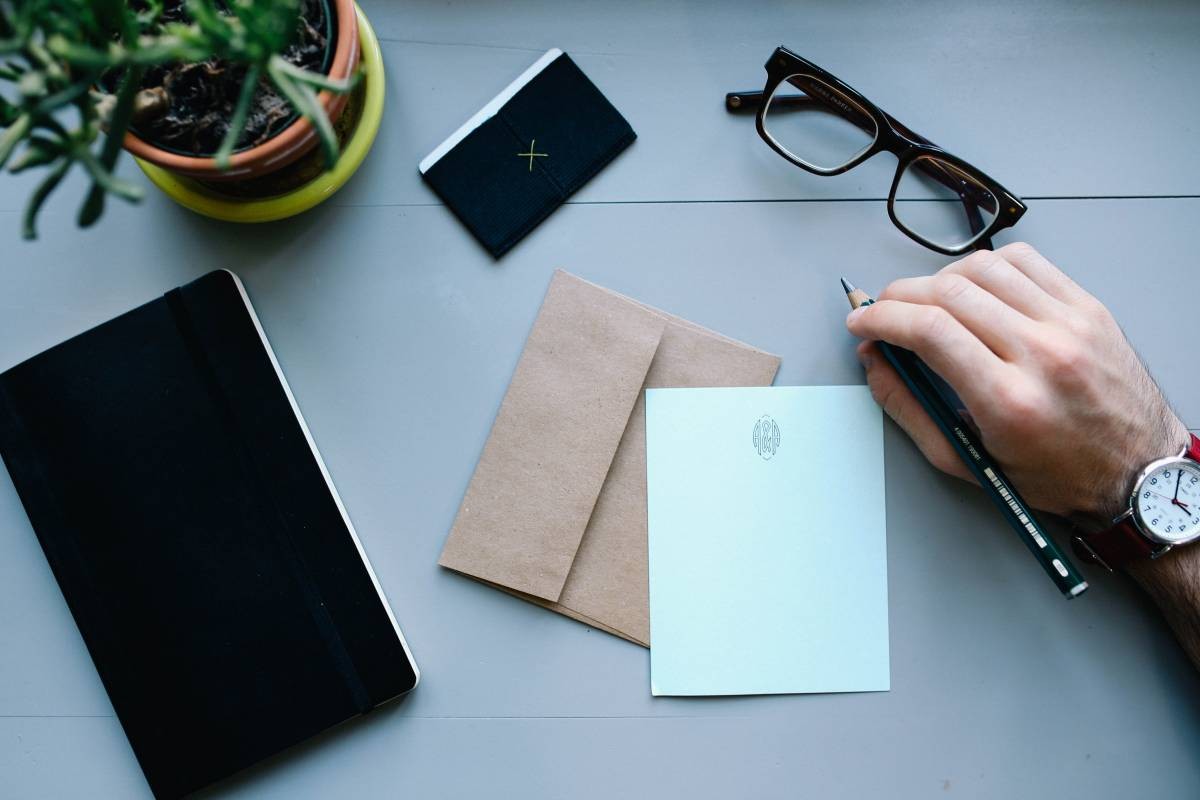
Thank You Email After Interview: 6 Sample Notes for All Jobs
Learn how to write a thank you email after a job interview. See a sample interview thank you email you can copy and use. Get actionable examples and tips!

Want to say a massive thank you professionally? You don’t have to splurge on flowers—just send a letter of appreciation to express your gratitude for a job well done.
In the world of work, there are many situations where a thank you doesn't cut it. It might be your boss being extra supportive, or maybe your employees finishing a massive task before the deadline.
Guess what—you can express gratitude without sending a hundred happy emojis. Just send them a well-written letter of appreciation. Not sure how to write one? Keep reading, and I’ll explain in detail.
This guide will show you:
Generating business letters in Zety’s online builder takes mere minutes. You can adapt our cover letter templates for a variety of other letter formats, including a letter of appreciation.
Sample letter of appreciation made with our builder—See other letter examples here.
Check our writing guides here to learn about other types of professional letters:
Table of Contents:
What Is a Letter of Appreciation?
How to Write a Letter of Appreciation to a Boss?
How to Write an Employee Appreciation Letter?
How to Format a Letter of Appreciation?
Maybe you’re still wondering,”What is a letter of appreciation? When do I send it? And why?”
A letter of appreciation is a short semiformal letter that expresses your sincere gratitude to the recipient. You can send an appreciation letter to a recruiter, an employer, a colleague, an academic advisor, and any other person who helped you in any aspect of life and whom you wish to thank.
As the name suggests, the purpose is to express how thankful you are. As the number of paper letters is decreasing, sending someone a letter of this kind can help to strengthen the business relationship. Especially in the modern world of remote work, where more than 50% of workers use instant messaging to communicate, and physical letters are a rarity.
In this guide, I’ll focus on two types of such letters:
Each type can be easily adapted. For example, you can use an employee appreciation letter to say “thank you” to a colleague or a friend.
Continue reading to see specific tips for each letter of gratitude and appreciation type.
Lack of appreciation at work is one of the leading causes of the Great Resignation. Learn more: What Contributes to the Great Resignation?
There are so many unfavorable stories about bosses that it’s easy to overlook those who actually support their employees. If your boss (or maybe another person in authority) has done something nice for you, it’s understandable that you want to express your gratitude and say thanks.
Here are some situations where a letter of appreciation to a boss is a good idea:
But how do you write an appreciation letter that covers at least one of the above? Check the below sample to find out:
Zara Mckinney
18016 Woodrow Estates, Suite 270
Port Hunter, MO 89054
(189) 435-1234
April 7, 2022
Ryan James
Marketing Manager
Blue Leaf Media
9350 Aurelia Ridge South
Mayville, MO 14680
Dear Mr. James,
Thank you for meeting with me earlier today. I enjoyed learning about the company culture and sharing my career goals with you. Our conversation has given me valuable insight into digital marketing, especially concerning content strategies.
I appreciate your advice regarding career opportunities that match my professional background and recommendations for online courses. I’ve decided to sign up for two of them, and I believe they will help me to develop my content creation skills.
You mentioned during our conversation that the key to successful content is understanding the target audience. It’s given me a lot of thought. Now, whenever I see a piece of content I admire, such as an online article, infographic, or YouTube video, I try to analyze it by thinking about the audience. I’m grateful for your professional advice.
Thank you for taking the time to talk to me.
Best regards,
Zara Mckinney
Now that you know why you should write a letter of appreciation to a boss, let’s look at how you should do it:
Whether you’re writing to your current boss or a potential employer, you should respectfully start your letter of appreciation. Here’s how to do it:
You may also add an academic title, such as professor, if the employer has one.
Pro Tip: Remember to do your research before deciding how to address the letter of appreciation. Check the signature in your boss’ emails, have a look at their business card, or check their profile on LinkedIn to ensure you know their full name. For example, if everyone calls your boss Sandy, her given name might be Alexandra or Cassandra, so don’t try to guess.
The recipient of your appreciation letter may not expect to get a message from you, so they’ll most likely want to know what the letter is all about immediately. Bosses receive a massive amount of emails daily, so you don’t want yours to get lost in their inbox. That’s why catching their attention in the first line and paragraph is important.
This is how to create the first paragraph of your letter of appreciation to a boss:
Remember that this is the most important part of your letter of appreciation. Keep it short: 2–3 sentences maximum. And be specific about why you want to say thank you.
Pro Tip: Sometimes, writing the first paragraph of a letter is the most difficult part. It’s best to go back to it after you write the rest of your letter and re-read it a few times to make sure it sounds good.
Everyone loves a bit of praise, especially if it’s sincere. However, in a professional setting, it’s important not to turn praise into flattery. You don’t want your boss to think you’re sucking up to them!
This is how you express praise in a letter of appreciation to a boss:
Remember that your letter of appreciation to a boss shouldn’t be too long, so keep this part limited to 3–5 sentences.
Feeling a bit lost in your current career path? Click here: 8 Steps to Choose a Career
It’s time to conclude your letter. You want the recipient of your letter of appreciation to feel good after they finish reading. So, it’s important to leave a lasting and great impression.
Here’s how to conclude a letter of appreciation to a boss:
Remember to sign your name by hand if you deliver a physical letter.
When making a resume in our builder, drag & drop bullet points, skills, and auto-fill the boring stuff. Spell check? Check. Start building a professional resume template here for free.
When you’re done, Zety’s resume builder will score your resume and tell you exactly how to make it better.
Now let’s get into the nitty-gritty of the other type of appreciation letter and start with—
There are many ways to show appreciation to your employees. You’ll be happy to know that you don’t have to give your best worker the keys to your Lambo. Instead, you can send them an employee appreciation letter that expresses your gratitude.
Here are some examples of when it’s a good idea to send an employee appreciation letter:
Now check the employee appreciation letter sample below:
Lenore Eldritch
Head of Marketing
Cosmic Horrors Inc.
123 Ambrose Lane
Algernon Town, PA 15032
October 10, 2022
Arthur Chambers
890 Gothic Road
Machen, PA 15038
Hello Arthur,
I would like to formally and sincerely express my gratitude for your amazing work. Recently, you’ve completed designing a complex advertising campaign for Byron Enterprises and accomplished all project KPIs well before the deadline and within the estimated budget. I know that this project was a truly challenging task, and I admire your ability to adapt your work style to achieve the goal.
Your ability to lead a team of creative professionals is truly outstanding, and it shows exceptional management skills as well as interpersonal qualities that are much valued in this company.
Your work has helped to strengthen the company partnership with Byron Enterprises and will surely benefit us in the future by increasing recognition and bringing more advertising projects in the future. I want you to know that I truly appreciate your work and that the marketing team values your efforts.
Again, thank you so much for your work. I can’t wait to see you excel at the next project you work on!
Sincerely,
Lenore Eldritch
Head of Marketing
Cosmic Horrors Inc.
Continue reading to see how to write an appreciation letter to an employee for outstanding performance:
Good news—you don’t have to be super formal. In fact, it’s better if you go with an informal greeting, as it sounds more personal. Go for “Hi,”“Hello,”“Hey,” or another form you usually use to greet your employees in person. Follow the greeting with your worker’s first name.
Pro Tip: If you’re sending the employee appreciation letter via email, use a subject line that clearly indicates this message is a good one. Employees often fret about receiving an email from a boss. Even a simple subject line such as “Thank you!” or “BIG Thanks!” can help to put the recipient at ease.
When employees receive a letter, they may initially have mixed feelings about it. Is this a good message? Is it a terrible one? You don’t want them to feel any doubts about its purpose. That’s why you should express your gratitude straight away.
Here’s how to write the first paragraph of an employee appreciation letter:
The tone of your letter depends on the company culture. Use formal language if you work in a traditional business with a solid hierarchical culture. You can use an informal tone when working in a smaller, family-like business or a modern startup environment.
Getting on well with your employees is important. For some bosses, it comes naturally. Others may have to work on it. Learn more: People Skills and Why They’re Important
The beginning of the letter has already put a smile on your employee's face. Now, you don’t want this smile to fade. That’s why the middle of the employee appreciation letter should be dedicated to praising their work.
This is the way to express your admiration for the employee in the middle of the letter:
It’s important to be specific when praising your employee—refer to the personality traits that make them good team members and recollect their accomplishments. Don’t be generic—you don’t want to sound phony.
Need to brush up on personality traits that matter at work? Check here: Describe People with These 100 Words
We’re nearing the end of your letter! Now is the time to repeat your thank-yous and wish good luck to your employee to reinforce your gratitude.
Here’s how to finish the employee appreciation letter:
If you’re sending the letter by email, you can also add your scanned signature at the bottom of the letter.
Writing business letters is one of the elements of written communication skills. Learn more: Why Are Communication Skills Important at Work?
You’ll be happy to hear that you don’t have to write the letter of appreciation by hand—a typed one is perfectly good. The key is to make it look business-letter-like.
Follow these steps to format your letter of appreciation:
See? It’s pretty simple and very similar to the standard formatting of a cover letter.
Remember that your letter of appreciation also needs a header with the contact information of the sender and the recipient—just as if you were creating a cover letter header.
Format the contact information this way:
Phew, that was easy!
Pro Tip: While emailing your letter of appreciation is the easiest way, a printed version will make a much better impression. You can either use the traditional post to deliver it or just place it on the recipient’s desk together with some nice flowers or a box of chocolates.
Plus, a great cover letter that matches your resume will give you an advantage over other candidates. You can write it in our cover letter builder here. Here's what it may look like:
See more cover letter templates and start writing.
Thank you for reading this guide! Have you ever written a letter of appreciation? Do you think letters of appreciation are useful? Comment below!
Learn how to write a thank you email after a job interview. See a sample interview thank you email you can copy and use. Get actionable examples and tips!
How to write a farewell letter to coworkers. Writing a farewell email? A goodbye email to coworkers gets a lot easier when you know exactly why you need it.
Learn how to write a follow-up email after an interview to convince every employer you’ll be the best hire they can get. See follow-up email templates and samples you can copy, adjust and use today. Read more!

